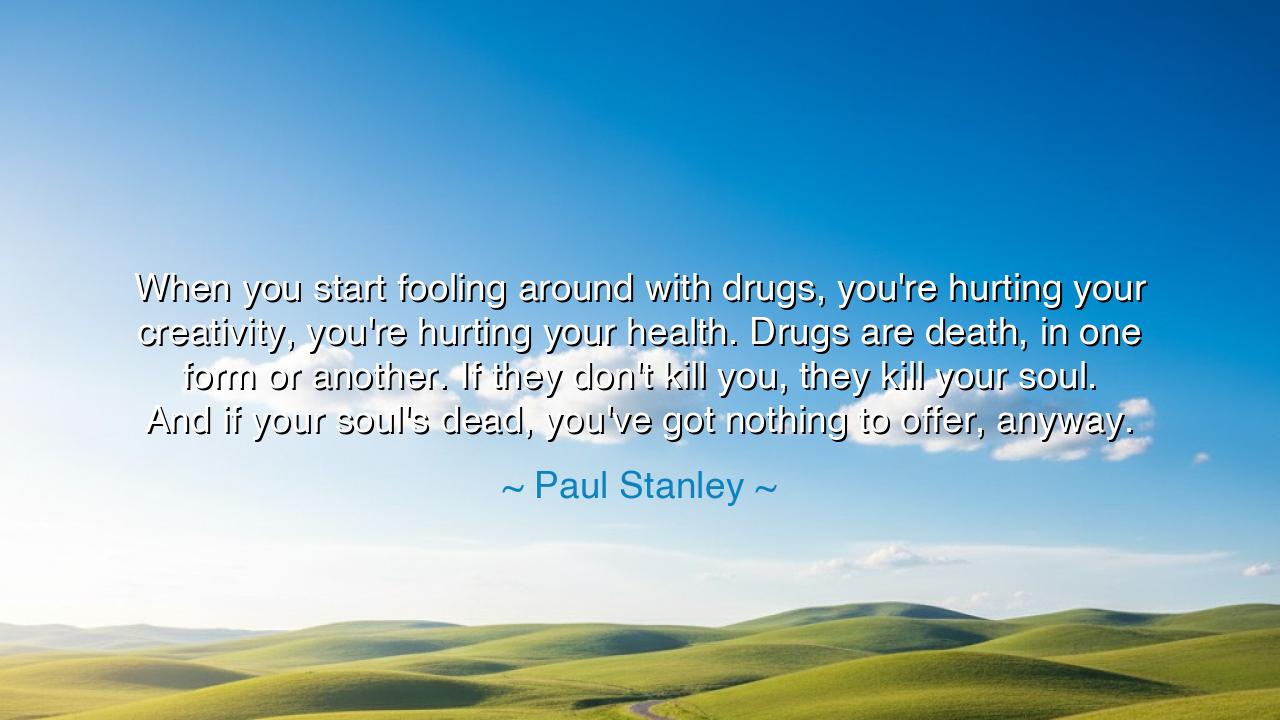
When you start fooling around with drugs, you're hurting your
When you start fooling around with drugs, you're hurting your creativity, you're hurting your health. Drugs are death, in one form or another. If they don't kill you, they kill your soul. And if your soul's dead, you've got nothing to offer, anyway.






In the fierce and cautionary words of Paul Stanley, we find the wisdom of a man who has stood at the edge of temptation and returned with truth in his hands: “When you start fooling around with drugs, you're hurting your creativity, you're hurting your health. Drugs are death, in one form or another. If they don't kill you, they kill your soul. And if your soul's dead, you've got nothing to offer, anyway.” These are not the words of moral judgment, but of experience — the words of one who has seen the brightest lights of fame dimmed by addiction’s shadow. In this reflection, Stanley, the frontman of KISS, speaks not only to musicians but to every human being who dares to create, dream, and live fully. His message is clear: the soul is sacred, and to poison it is to destroy the very spark that makes life worth living.
From the earliest days of civilization, the ancients warned of false gods — things that promise freedom but deliver bondage. In our age, drugs have become such idols. They whisper of inspiration, of escape, of strength, but in truth, they devour what is most precious. Stanley’s words reveal that these substances do not merely harm the body; they strike at the heart of creativity and spirit, where the fire of genius is born. For every artist, every thinker, every soul who dares to reach for greatness, the mind must remain clear and the spirit unbroken. To numb pain may seem to ease it for a moment, but in doing so, one dulls the very senses that give birth to art, love, and wisdom.
The origin of Stanley’s warning lies in his long journey through the tempest of rock and roll. In a world where fame and indulgence intertwine, many of his peers fell to the lure of excess. He watched as brilliant artists — men and women of immense talent — lost their voices, their passion, and their lives to addiction. For Stanley, who chose clarity over chaos, the lesson was carved into the fabric of his life: to protect one’s gift, one must protect one’s soul. His defiance of the destructive culture surrounding him was not prudence alone — it was rebellion of a higher kind, the rebellion of a man who refused to let darkness claim his light.
Consider the tragic story of Jim Morrison, the legendary singer of The Doors. His voice could summon storms, his words could unravel the mysteries of desire and despair — yet he sought meaning through substances that promised transcendence but delivered only ruin. His creativity burned like a meteor, brilliant but brief, extinguished before its time. Morrison’s story is the living echo of Stanley’s warning: that the path of intoxication, however alluring, leads not to greater art, but to silence. The mind that is enslaved cannot create freely; the soul that is dulled cannot sing.
Stanley’s declaration that “drugs are death” must be understood not merely as physical demise, but as spiritual decay. For when he says that drugs “kill your soul,” he speaks of the slow erosion of one’s inner world — the loss of wonder, of sensitivity, of love. The soul dies not all at once, but little by little, as purpose fades and dependence deepens. And when that death comes, even if the body survives, there is nothing left to give — no truth, no art, no light. It is the greatest tragedy of all: to be alive, yet empty.
Yet his message is not one of despair, but of redemption. Stanley reminds us that the soul, though fragile, can be guarded and restored. By choosing clarity over numbness, discipline over indulgence, one keeps alive the sacred flame of creation. To be sober is not to be joyless — it is to be fully awake, to feel the music of life with every breath. The artist who creates from a clear mind gives the world something pure; the individual who lives without self-destruction offers the greatest gift of all — their authentic self.
Let this, then, be the teaching drawn from Paul Stanley’s words: guard your soul as you would guard your life. Whatever your art, whatever your dream, do not surrender it to the false comfort of escape. Pain will come, as it always has, but it is through pain that strength and beauty are born. Face it. Feel it. Transform it into something immortal. The mind that remains unclouded can build worlds; the soul that remains alive can heal others.
And so, O listener, remember: there is no greatness in self-destruction, and no glory in oblivion. The true artist, the true human, lives with eyes open, heart burning, and soul intact. As Paul Stanley teaches, the body may be the vessel, but the soul is the gift — and once it dies, all else is dust. Protect it, nurture it, and let it sing, for in its voice lies the power to move the world.






AAdministratorAdministrator
Welcome, honored guests. Please leave a comment, we will respond soon